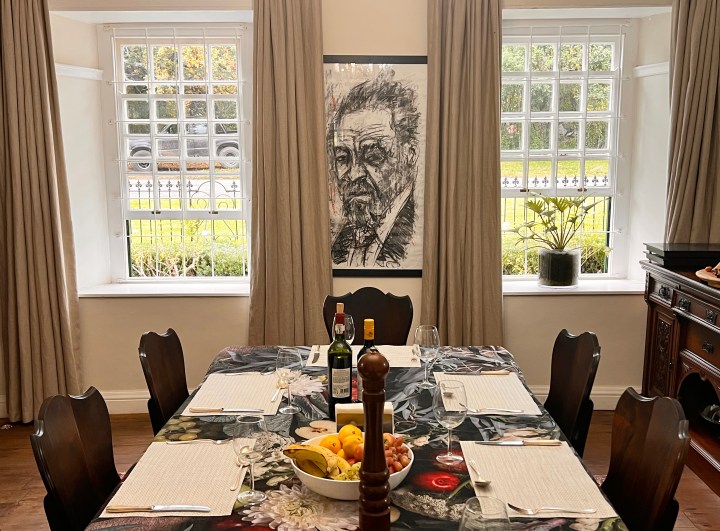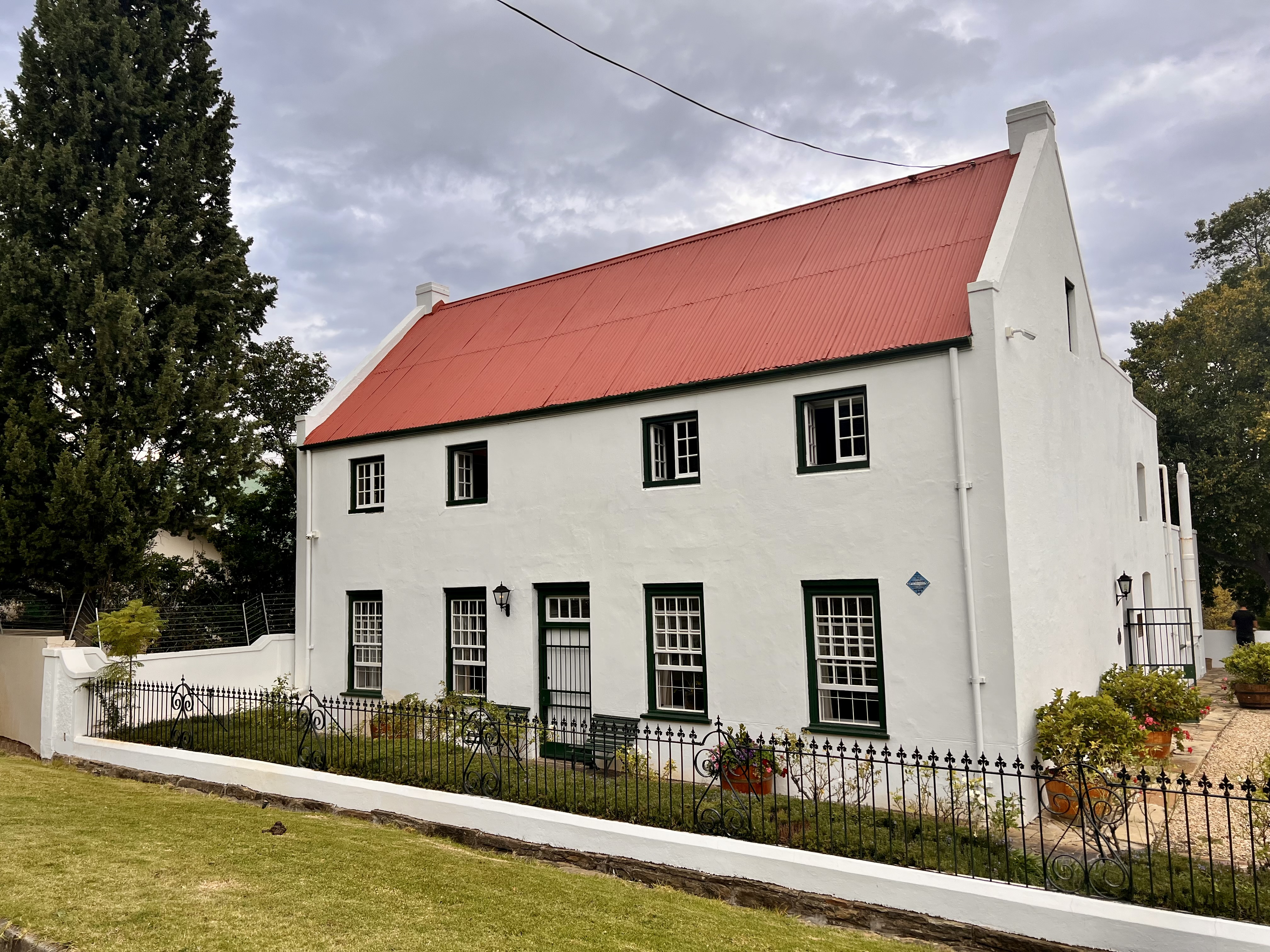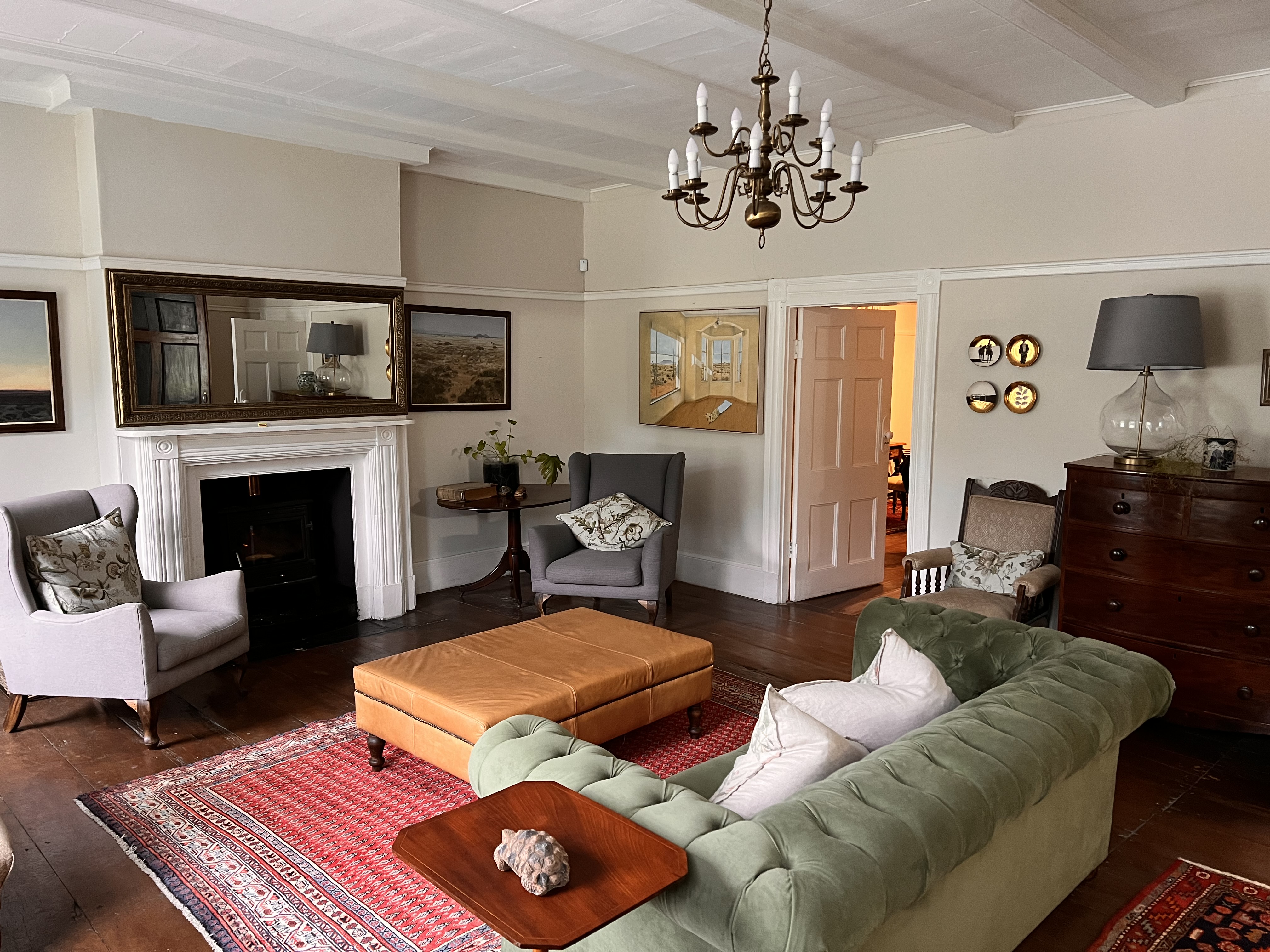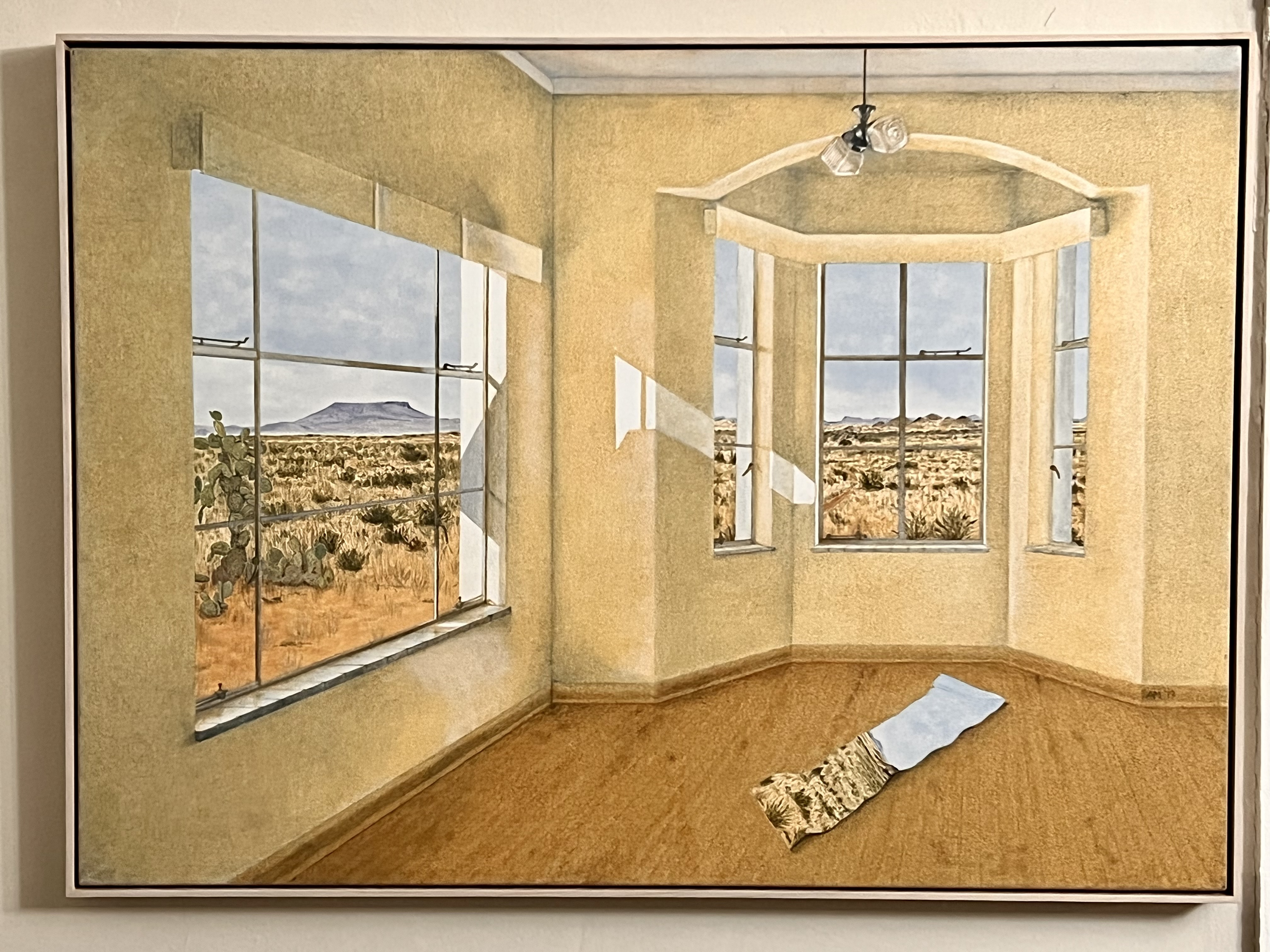KAROO DREAMING
Inspiring Words: The stories we pass on the roads through our lives

Around the table at a beautiful old house in Somerset East are four aspiring writers with big dreams. A poet and short story writer from Malawi; a retired schoolteacher in his 70s; a former politician with a dark family story to tell, and Juliette, the youngest, who lives in a shack.
If you want to write, first find an old house in the Karoo. In the dining room of lovely Paulet House in Somerset East, hugging the foothills of the Bosberg, minds full of stories and disparate experiences come together over food and wine. Gazing down on them are the eyes of the people who have informed their and our lives. Joe Slovo and Nelson Mandela, with Graça Machel between them, and beyond Madiba’s shoulder, the grim, bearded figure of Jakes Gerwel. Frederik Van Zyl Slabbert with a young Thabo Mbeki, with Jakes Gerwel to Mbeki’s right. Tutu at a Cosatu rally, flanked by Jakes Gerwel. Danielle Mitterand with … you guessed. The great man looms large here.
Between the windows beyond the table’s end is Eastern Cape artist Dhatini Mzayiya’s magnificent portrait of Professor Gert Johannes Jakes Gerwel; academic, staunch fighter against political ills, past chair of the Mandela Rhodes Foundation, and Honorary Freeman of the town of Somerset East. His story is here. Legend is here. History is here. And stories are honed here.
Paulet House holds 200 years of stories, and more are being written, right now. At lunch time and in the evenings, they gather at the big dining room table to link minds and share their stories; not the ones they are writing so much as the tales from their lives; where are you from, where were you when; what do you think…. They had not known one another before coming here for the first time, earlier in the year, at the start of this journey they are all on. A journey that ends in a book, for most of them, possibly all. It is encouraging them on that path to that end result that has brought them here.

Paulet House in Somerset East, the Eastern Cape town once called simply Somerset. Thirty years after it was established, Somerset West in the Western Cape came into being, so ‘East’ was added to its name. (Photo: Tony Jackman)
The Jakes Gerwel Foundation has invited me to experience this marvellous house and a weekend in the company of four prospective writers and their two mentors. I am enticed to discover not only Paulet House and what it stands for, but the town it exists in, in the greenest part of the Karoo. In my ramblings I meet lively, erudite Ros Turner from the Walter Battiss Museum next door, and Debbie Abrahamson, my host at the beautiful Gardiol Country House, and spend time in the herb and fruit garden beyond the big house.
It’s impossible not to be drawn into the bubble of creativity and bright, rich conversation. All of this while sipping wine provided by our hosts and eating food made by their own chef, Gilbert van Zyl, who welcomes us with samoosas and spring rolls, meatballs and sticky ribs; at dinner time we’re treated to Thai chicken curry one evening, his wondrous lamb curry the next; his signature Fillet Mignon is to come out on the third night, which sadly I have to miss. There’s his lemon meringue tart for dessert, with a pile of koeksisters tempting on a plate alongside it.
This is fertile ground for creativity. The Jakes Gerwel Foundation works with NB Publishers in their Mentoring Programme for Upcoming Writers of Fiction and Non-fiction to support emerging writers to develop their manuscripts and make them publishable. The writers and mentors meet at Paulet House several times during their mentorship year, continuing their mentoring relationship by email in between.
This is a significant effort: of all manuscripts submitted to publishers in South Africa, 5% are published. You might expect the prospective writers who come here to be young, and some are. But the eldest, Hans Kisting, is 73. Allen Grootboom, 67, is a retired politician and psychologist and the author of Taking the Face Off and Angels, Dreams, Visions: Stairways of the Soul. Nixon Mateulah, a Malawi-born poet and short story writer, is 49. And Juliette Manitshana-Mnqeta, who charmed me with her wit and bright ideas, is 35, a baby by comparison. It’s not their ages that’s pertinent: it’s that they have stories to tell.
Suzette Kotzé-Myburgh, the Afrikaans mentor, told me that most people who want to write will never publish, and those manuscripts that reach a publisher are well off being “ready”.

Above: The lounge at Paulet House with, on the far wall, a painting by Annari van der Merwe of the Karoo seen from inside a characterful old house. Below: a closeup of the painting, which Tony Jackman fell in love with but was not allowed to take home. (Photos: Tony Jackman)
 “The Gerwel Foundation was very clever,” she said. “They made it clear they needed a publishing partner [that’s NB] because it is important for affirmative action to take place in the publishing world. People who come on this programme can write, and they have a story to tell, but they are sitting with their work at 50% and the mentoring is filling in that gap between the 50 and 70%. That is why this programme is open to many different people who have never published before and do not have the resources to pay for someone to mentor them. So on this programme we are working to get your manuscript to the point where they will say ‘yes’.”
“The Gerwel Foundation was very clever,” she said. “They made it clear they needed a publishing partner [that’s NB] because it is important for affirmative action to take place in the publishing world. People who come on this programme can write, and they have a story to tell, but they are sitting with their work at 50% and the mentoring is filling in that gap between the 50 and 70%. That is why this programme is open to many different people who have never published before and do not have the resources to pay for someone to mentor them. So on this programme we are working to get your manuscript to the point where they will say ‘yes’.”
The writers Kotzé-Myburgh is mentoring are Hans Kisting, from Wellington, and Allen Grootboom, who lives in George. Grootboom’s story is dark and chilling, and it’s real. A former politician (he retired in 2019), his Afrikaans manuscript, Die vuur huil, tells the story of fictional Jakob Koetaan and his family who were dispossessed of their farm. A family tragedy witnessed by the young Grootboom is at its heart. He explains that it was not political. “Members of my family were poisoned and murdered. Four of my father’s brothers were poisoned, and my uncle.”
On New Year’s Eve in 1960, “their beer was poisoned and they died. They were young men. I was six years old and I was there that night and I remember it vividly. We were young boys getting wood for the fire, the three legged pots, and watching the slaughter of the sheep. They were drinking and being happy and then one started getting cramps.
“My brother and cousin got on the horses but the farmer next door had gone to the coast. They had to ride to the nearest town but it was too late.”
The culprit, “a disgruntled, jealous member of the family”, was hanged. “It was one of the brothers. He was brought to justice. My father survived because he didn’t drink. He took it upon himself to look after the family after that.”
Kotzé-Myburgh’s other charge is Hans Kisting, at 73 the most senior of the group. He was born in the Keetmanshoop district and matriculated in Rehoboth, where his father built the Catholic church. He spent part of his childhood in a village in the Kalahari and is of Nama and European heritage. His memoir explores his childhood background in the 1950s. “I’m retired now, but somewhere along the way I wanted to write something. In 1999 I did a solo cycle tour, 1,500km; I was 50.” He cycled from Wellington to Windhoek “to see if I could still do it”. It took him 19 days.
He felt inspired to write. “I wanted to see what I could remember and I can remember from when I was three or four years old.”
Kisting says, sweetly, “A person must do what they love otherwise something will go wrong inside of them.”
Mentoring the two participants with English manuscripts is Angela Briggs, previously at Fundza and Cover2Cover. Her charges are Nixon Mateulah and Juliette Manitshana-Mnqeta, though Juliette has toyed with the pen name of Juliette Capulet.
“Nixon is Malawian,” Briggs says. “He is writing a novel based on personal experiences, coming from Malawi to Joburg and via Joburg to Cape Town. Juliette went to Westerford High School in Cape Town. She’s so funny and she’s into writing whodunnits, a wonderful detective story set in Knysna; she’s very self-deprecating and with her my work is getting her to trust her own voice.”
Nixon Mateulah’s story started in faraway Malawi, which he left for Pretoria in 1996. His fictional memoir is called Running Home. He started writing it when he was 20; he is 49 now.
Nixon, who now lives in Grassy Park, Cape Town, started writing short stories in high school; a number were published. His father’s death sent him to Pretoria, and it’s been a long slog ever since, but he never stopped writing. Even when working long days in Pretoria he’d get up and read and write for two hours before going to work.
Briggs’ other charge, Juliette Manitshana-Mnqeta, is a freelance Labour Court transcriber. She and her husband live in a shack in Plettenberg Bay. Her crime novel has the working title of If The Dead Could Talk. There is a palpable sense of excitement about her that her mentor Briggs is unable to suppress.

Above: The welcoming platter of chef Gilbert van Zyl’s samoosas, spring rolls et al. Below: Breakfast at Gardiol Country House near Somerset East. (Photos: Tony Jackman)
 Sitting down at the big Paulet House dining table to chat about her manuscript, she tells me she had wanted to become a journalist. “Then there was something on the news about a journalist who was buried alive and my brother said to me: ‘Hey, I don’t want to come looking for you. This writing is a dangerous business.’”
Sitting down at the big Paulet House dining table to chat about her manuscript, she tells me she had wanted to become a journalist. “Then there was something on the news about a journalist who was buried alive and my brother said to me: ‘Hey, I don’t want to come looking for you. This writing is a dangerous business.’”
When people ask her why she doesn’t write romance, she replies in a melodramatic tone, “I’m drawn to crime … and how it’s solved.”
On leaving Westerford high school, she had found herself discouraged by an employer. “When I left school I got a job at a property business. They just wanted a black face so they said to me, ‘It’s fine, you’ve got the job even though you don’t know how to be a receptionist. We’ll train you.’ I told my boss, not a very nice man, that I wanted to write, to be a writer, and he said: ‘You can write, sure, but you’re not exceptional.’ So I stopped writing.”
But, like Grootboom, there is tragedy in her family, and this brought her back to writing. “My sister was hijacked and killed in Cape Town in 2001. She was 33 and I was 14. In 2011 my brother (in his 40s) was mugged on his way to his office. I don’t think the mugger wanted to kill him but he hit him on the head and he died. No one was caught for either my sister’s murder or my brother’s.”
She has a way of dealing with this in her writing. “In my novels all the crimes are solved, the criminals are caught and the victims have closure. Perhaps that’s why I write crime fiction, for closure.”
This February she and her manuscript were at Paulet House for the first time, with only a few months to go before it is presented to prospective publishers along with those by Grootboom, Mateulah and Kisting. If, or dare I suggest when, her manuscript is published it will be another milestone in the very high strike rate of this mentorship programme.
But when she leaves Paulet House it’s back to the shack in Plett. She and her husband had lived in a shack in Knysna, then they qualified for an RDP house, which is being built for them.
Those shacks and RDP houses we pass in our shiny cars. There are stories in them. DM/TGIFood
Find out more about the Jakes Gerwel Foundation.




 Become an Insider
Become an Insider
Every week, food for our tummies, food for thought and food for the soul. My weekly feast.